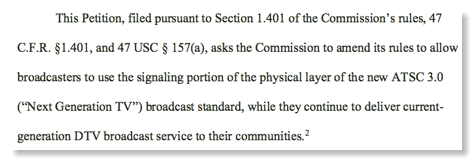Will FCC Punish NAB for Raising the §7 Issue in Its ATSC 3.0 Petition?
New technologies and services
(a) It shall be the policy of the United States to encourage the provision of new technologies and services to the public. Any person or party (other than the Commission) who opposes a new technology or service proposed to be permitted under this chapter shall have the burden to demonstrate that such proposal is inconsistent with the public interest.
(b) The Commission shall determine whether any new technology or service proposed in a petition or application is in the public interest within one year after such petition or application is filed. If the Commission initiates its own proceeding for a new technology or service, such proceeding shall be completed within 12 months after it is initiated.
Indeed, a prominent communications attorney in private practice told me a few years ago that FCC would punish any party who had the temerity to claim entitlement to timely action for new technology under this provision by delaying any action even more than usual! (As Mitchell Lazarus showed in his comments in the still pending after 7 years "Innovation NOI", Docket 09-157, 2-5 year delays are common even for noncontroversial policy changes for new technology!)
Along the same lines, a senior current 8th Floor staffer told me that mergers at FCC should get higher priority than new technology issues because mergers add more to the US economy! (Note this staffer was not from Comm. Rosenworcel's staff since she believes that FCC's past unlicensed spectrum decisions "contribute $140 billion in economic activity annually".)
Your blogger is not opposed to mergers or FCC merger reviews, just puzzled why merger reviews have a published timetable that is usually met while the provisions of § 7(b) are consistently ignored.
But my unnamed lawyer friend does not represent NAB and its ATSC 3.0 copetitioners. Thus my surprise when I read this introductory section of NAB's ATSC 3.0 Petition for Rulemaking.
Did NAB touch the "third rail" of FCC policy deliberations: § 7 ? Will FCC punish NAB for claiming Section 7 status?
Actually various senior FCC staffers over the years have said this is not a problem because "everyone knows" that § 7 is just advisory and doesn't mean what its plain language says it means. Well apparently NAB and its copetitioners Association of Public Television Stations, AWARN Alliance, and Consumer Technology Association (former CEA) didn't know that! But if such knowledgeable groups as NAB and CTA were fooled by the apparent plain language of § 7 isn't it reasonable that an "outside the Beltway" startup might also believe what the law appears to state?
Isn't time for FCC to take the Chevron decision precedent and state clearly what it really thinks § 7 means? Clearly a lot of people are confused here. If FCC decides after 30+ years that § 7 needs updating or clarification, it has an annual opportunity to ask Congress for such changes. To my knowledge it never has, preferring to ignore the issue.
Will FCC punish NAB with extra delay for having raised this ugly issue as my unnamed friend predicted? NAB is nowhere as powerful it was two decades ago since CTIA is clearly the alpha male of FCC regulatees these days. (You don't see CTIA raising § 7 issues - they don't have to in order to get their way!)
Broadcasters no longer "alpha male" at FCC
.@youtube: “we reach more 18-49 year olds during primetime than the top 10 TV shows combined” https://t.co/9xjRY3sGQP
— CTIA (@CTIA) May 6, 2016
But acknowledging the § 7 issue in any FCC action on this petition would be very awkward for the § 7 denialists at FCC who redact the section from all paper copies of the Comm Act on 12th St., SW and use the FCC "great firewall" to keep the staff from finding it on WestLaw.
Perhaps FCC insiders can convince NAB et al. to quietly amend their petition and bury this awkward issue?




![Validate my RSS feed [Valid RSS]](valid-rss-rogers.png)

